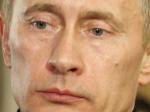Vladimir Putin's next move could be to block the transit of gas through Ukraine to Europe, write Morgan Stanley analysts.
This could cause energy prices to spike in Putin's effort to retaliate against the world for imposing economic sanctions on Russia.
New SanctionsThe U.S. and the European Union announced a fresh round of economic sanctions on Russia in their efforts to punish to the country for its ongoing involvement in destabilizing Ukraine.
Policymakers are hoping that these actions will encourage Putin, the Russian president, to help cool off the situation on the Ukraine-Russia border.
But he very well could get more aggressive.
Two PathsMorgan Stanley analysts Jacob Nell and Alina Slyusarchuk articulate Putin's two potential paths.
"We think Putin now faces a stark choice between a pragmatic response, supporting de-escalation in Ukraine in return for neutrality, decentralisation and the lifting of sanctions — or what we characterise as a ‘patriotic’ response, in which Putin focuses on support to the pro-Russian separatist movement in Ukraine, which could trigger a further tightening of sanctions and deepen the divide with the West," they wrote in a note to clients on Tuesday.
In theory, economic sanctions should anger businesses and consumers who are getting squeezed. But in practice, sanctions often just spark nationalism, and anger is often directed toward the implementer of those sanctions.
Indeed, polls show that Putin's popularity has only been increasing since earlier sanctions. It's also worth mentioning the Russian stock market is rallying.
Eye For Eye"Russia has announced that it will not respond in an ‘eye-for-eye way’ — and in any case, we think that a reciprocal approach would not be effective, given different dependencies," said the analysts. "For instance, few G7 citizens or leaders have assets or family in Russia, and Russian banks are not an important source of finance for G7 countries. In fact, if Russia responds with economic measures, we think the most effective measures are likely to be restrictions on exports of oil (Russia exports more than 7.5 million barrels of oil equivalent a day) and gas (where Russia provides 30% of Europe’s demand)."
Unfortunately for Russia, if it cuts the world off from its energy, then Russia effectively shoots itself in the food.
"We are skeptical at this stage that Russia would block oil exports, given the disruptive impact this would have on the budget (oil accounts for 44% of federal budget revenues) and trade (oil accounts for 54% of exports)," said the analysts. "Moreover, Russia did not block oil exports in the early 1980s, when the Cold War was at its height."
For now, Russia's response is likely to be more targeted.
"We think that Russia could block transit of gas through Ukraine to Europe, pending settlement by Naftogaz of outstanding debt and might also allow a decline in oil exports, which could add a geopolitical risk premium to the oil price," they write.
The ConsequencesHere's Morgan Stanley's scenarios for the financial markets: "In the case of de-escalation, we would expect to see the authorities stick to the current policy mix of a flexible RUB and the fiscal rule, with continued trade and investment links with the West. With a ‘patriotic’ response, we would expect tighter monetary policy to support RUB; looser fiscal policy to support growth; and a focus on reducing economic links with the West to reduce vulnerability. Recently, we have seen some signs of economic policy drifting towards the ‘patriotic’ policy mix."
See Also:
- Russian Stocks Are Laughing Off The Latest Sanctions
- 3 Types Of Employees You Should Fire Immediately
- A Former IDF Soldier Describes The Moment That Changed His Outlook On Operations In Palestinian Territory
- The Stock Market Has Been Predicting Russian Crises Since 1857
- Here's How Dependent Russia's Economy Is On Oil And Gas
